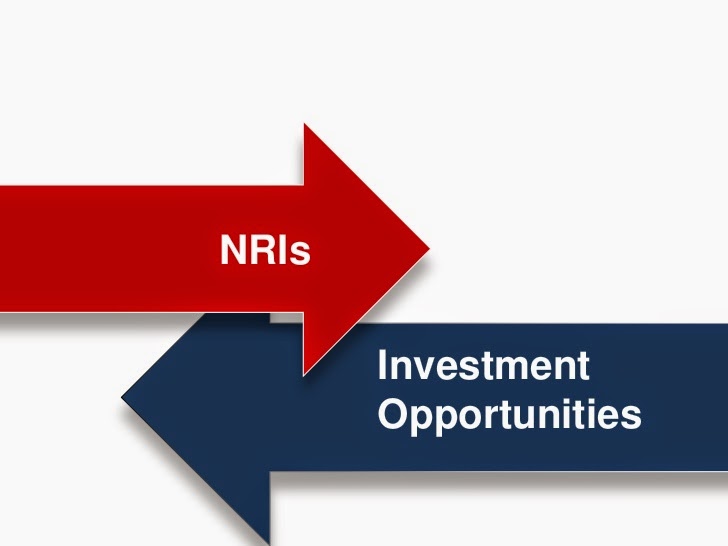 Zerodha (Trading & Demat Account)
Zerodha (Trading & Demat Account)
FREE Equity Delivery and MF
Flat ₹20/trade Intra-day/F&O
 Zerodha (Trading & Demat Account)
Zerodha (Trading & Demat Account)
FREE Equity Delivery and MF
Flat ₹20/trade Intra-day/F&O

|
|
Published on Wednesday, April 15, 2020 by Chittorgarh.com Team | Modified on Thursday, June 4, 2020

An NRI looking to invest in India but confused whether it is worth going ahead and where the investments can be made and to what extent, you have landed at the correct place. In this article, we will cover the basics of NRI trading along with investment options with rules and restrictions. Let us first understand that who qualifies as NRI.
Non-Resident Indian (NRI) is a person resident outside India who is either a citizen of India or is a Person of Indian Origin (PIO).
NRI has been defined by the Foreign Exchange Management Act (FEMA) as well as the Income Tax Act. Though both definitions have similarities to some extent, it is important to understand the difference between the two as the underlying intent for both of them is different.
The residency status as per the FEMA Act helps decide how and where to invest and residency status as per Income Tax decides how the income from various investments will be taxed.
India is one of the fastest-growing economies in the world with an average annual GDP of 6-7% for the last 5 years and has the potential to emerge as a superpower in the coming decades.
India is a developing country and has a vast scope for development across various sectors giving ample opportunities for wealth creation.
India has the largest youth population in the world containing millennials and Generation Z who can turn the entire outlook of the country in the near future.
With a Compounded Annual Growth rate (CAGR) of 10%, the Indian stock market is expected to become prominent in upcoming years with many stocks in its kitty to give a CAGR of more than 10%.
Indian Mutual Funds have been giving spectacular performance over the past few years fetching very good returns on the investments. Moreover, investing in mutual funds is quite easy and convenient and does not require specialized knowledge, research, and skills as in the case of equity. The professional team of fund managers manage the portfolio for us and diversify funds by doing proper asset allocation.
Considering all the above factors Indian markets offer a lucrative platform for NRI to invest in India.
Though all measures and initiatives are being taken by the Government to make NRI trading simpler, there are certain restrictions which every NRI should be aware of:
Apart from the secondary capital markets, NRI investments are permitted to invest in below securities without any limit:
The following are the investments permitted to NRIs on repatriation basis.
The following are the investments permitted to NRIs on non-repatriation basis.

Here are the steps to facilitate trading by NRIs in India:
Open NRE/NRO Account:
The NRI has to open NRE or NRO savings bank account with a bank. Based on the fund remittance and purpose of opening the NRE/NRO account, you can open the Repatriable/Non-repatriable account, respectively.
Obtain a PIS letter from the banks:
After opening an NRI Bank Account, the bank will provide a PIS letter approved from RBI to invest in Indian stocks. In the case of the NRO account, you are not required to get approval from RBI for trading as RBI has waived off the PIS requirement for the NRO mode of transactions. However, the broker with whom you are trading should offer to trade without PIS else PIS would still be required.
Open a Demat & trading account:
After opening a savings account and get approval from RBI for PIS, you can open Demat and trading accounts with the stockbrokers. While opening Demat & trading accounts with the broker, you have to provide a PIS letter to link it with the NRI savings account.
Note:
Here is the process for NRIs to trade in India:
No, NRIs are not permitted by SEBI to do intra-day trading in the Indian Stock Market. NRI cannot buy and sell the stocks the same day at BSE and NSE as Equity Intra-day segment is not enabled in the NRI trading account.
NRIs can invest in the stock market using Equity Delivery-based Trading, Equity F&O, and Currency F&O.
NRIs are also not permitted to trade in Commodities at MCX.
An NRI can have a trading account in India to invest in Indian stock markets.
An NRI should open an NRI Trading Account, NRI Demat Account, and NRI Bank Account to make investments in the capacity of an NRI. An NRI cannot continue with the existing resident trading account in India and is required to be closed to avoid any issues.
An NRI is required to open an NRE or NRO trading account linked to NRE PIS or NRO PIS/ Non-PIS bank and Demat accounts to trade on repatriation and non-repatriation basis respectively.
An NRI is required to maintain an NRI Trading Account,NRI Demat Account, and an NRI Bank Account to trade and invest in Indian stock markets. In addition to this, an NRI needs a PIS approval from RBI to trade on a repatriation basis. With recent changes in RBI rules, the PIS approval to trade on a non-repatriation basis has been waived off.
The NRI accounts are further classified as Non-Resident External (NRE) account or Non-Resident Ordinary (NRO) accounts based on the repatriability. An NRI is required to open an NRE to trade with repatriation benefits and NRO account to trade without repatriation benefits.
In addition to the above, an NRI is required to open an account with the custodian to trade in derivatives. However, if the broker is providing the clearing services to the NRI clients, an NRI is not required to open a separate custodian account. The broker/custodian can apply for the custodial participant (CP Code) required for F&O trading.
Summary of accounts required for NRI Trading:
|
Investment Type |
Accounts (repatriation basis) |
Accounts (non-repatriation basis) |
|
Equity |
NRE PIS Bank account NRE PIS Trading Account NRE PIS Demat Account |
NRO PIS/Non-PIS Bank account NRO PIS/Non-PIS Trading Account NRO PIS/Non-PIS Demat Account |
|
Derivatives |
N.A. *Not permitted to trade on repatriation basis |
NRO Non-PIS Bank account NRO Non-PIS Trading Account NRO Non-PIS Demat Account CP Code |
|
Mutual Funds |
NRE Bank account NRE Trading Account NRE Demat Account |
NRO Bank account NRO Trading Account NRO Demat Account |
NRI Intra-day trading Vs Delivery-based Trading
| Particulars | Intra-day trading | Delivery-based trading |
|---|---|---|
| Meaning | Intra-day trading is speculative buying or selling of stocks either once or multiple times during the same day. | Delivery based trading means if an investor buy stocks, he/she has to take delivery of stock by making payment for the same. The stock are held in the demat account as long as the investor wishes and be the owner of it. |
| NRI Trading | NRIs are not allowed to do intra-day trading. | NRIs are allowed to do only delivery-based trading. |
The RBI caution list and RBI ban list are available on the RBI website and are updated as and when the foreign investments reach the trigger limit or the ceiling.
The RBI caution list is updated and notified to all authorized dealers when the total holdings of Foreigner Institutional Investors (FII)/NRI reaches 2% below the applicable limit. Any further purchases are subject to RBI approval.
The ban list is updated d when the total holdings of FII/NRIs reach the statutory limit and no further purchases are allowed.
Once security comes under a caution list, further purchases are subject to RBI approval which is given on a first come first serve basis. Hence an NRI may or may not get RBI approval to buy the scrips under caution list based on availability.
No, once the securities are placed in the ban list no further purchases are allowed unless the security comes out from the ban list.
Short selling is selling of a security that is not owned by an investor but is borrowed from the broker.
An investor may think that the price of a stock may fall within a week hence he would borrow the stock from the broker with a promise to return within the agreed timeframe. If the price of the stock drops within a week the investor would make a profit by buying it from the market at a lower price and return the stock to the broker. However, if the price of the stock goes against expectations and it increases, the investor would have to buy the stock at a higher price and suffer loss to fulfill his stock obligation.
Short selling works well in the bearish market.
NRIs are prohibited from short selling as per regulations.
Nidhi Company is like a non-banking financial company that is listed as a public limited company with the sole purpose of accepting deposits and lending funds to its members.
Government dated securities are long term instruments issued by the government for mobilising funds. These securities carry either a fixed or floating rate of interest (known as coupon rate) which is paid on the face value at regular intervals. The tenure for these instruments generally ranges between 5 years to 40 years.
Treasury bills popularly known as T-bills short term instruments issued by the Government of India with tenure of 1 year or lesser. There is no interest payment on these bills. T-bills are issued at discount and redeemed at face value on maturity.
A mutual fund is a trust that is managed by a professional and expert fund manager that pools money from various investors with a common objective and invest in different asset classes.
PSUs are state-owned enterprises that are owned by either Central, State, or both. The government stake in such companies is more than 50%.
Infrastructure Debt Funds are debt funds meant to promote funding in infrastructure sector.
Perpetual debt instruments are debt funds with no maturity date. The issuer keeps paying interest forever till either the company dissolves, closes down, or till the investor holds the bond.
The aggregate ceiling of holding in Perpetual Debt Instruments should not exceed 24 percent of each issue and investment by a single NRI should not exceed 5 percent of each issue.
NPS is a retirement saving scheme introduced by the government of India to provide security in old age. NPS is governed and administered by the Pension Fund Regulatory and Development Authority (PFRDA). The accumulated saving in NPS is repatriable.
Chit fund is a saving and borrowing tool run by registered chit fund companies under Chit Fund Act 1982. In chit funds, a group of people agree to contribute a specific sum of money for a specific period of time on monthly basis which is then given to one person as loan on lottery or auction basis after deduction of the chit fund commission.
No. NRI is not allowed to place an Intraday order. They are only allowed to trade in Indian stock markets on a delivery basis.
Every time while transacting the shares, they have to take or give delivery of shares because even short selling is not allowed.
Note that NRI are permitted to trading in stock and currency derivatives at BSE and NSE.

Add a public comment...

FREE Intraday Trading (Eq, F&O)
Flat ₹20 Per Trade in F&O
|
|